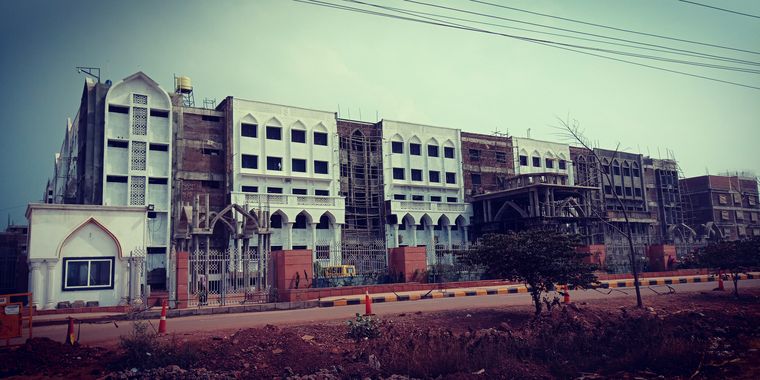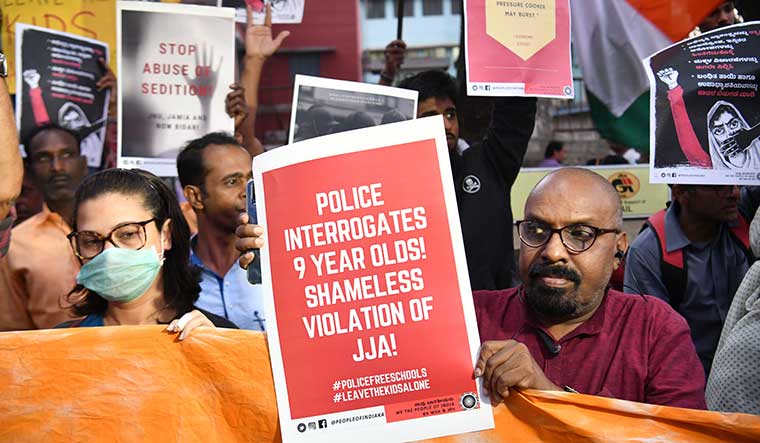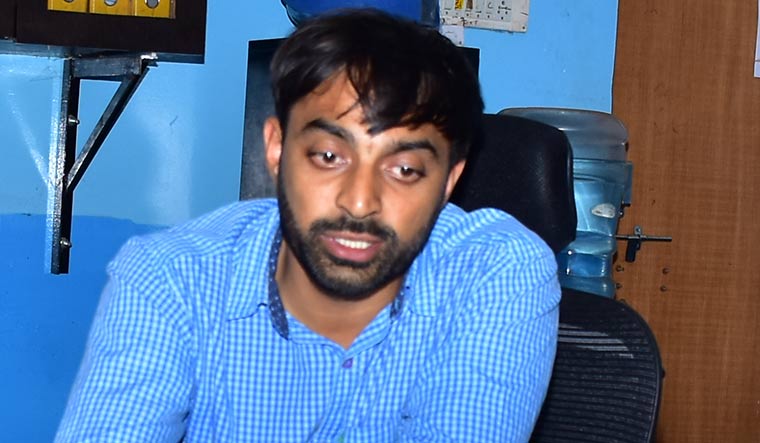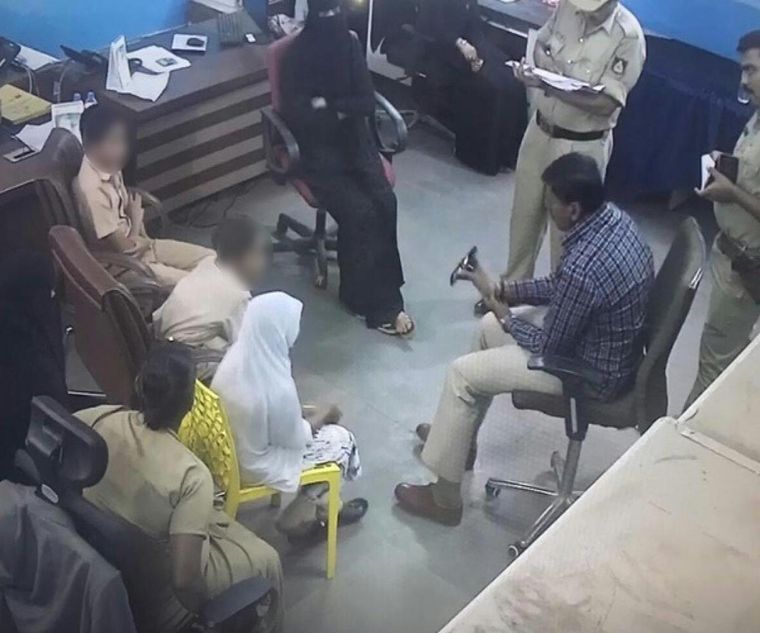Two burqa-clad women walk the dimly lit corridors of the district jail in Bidar, Karnataka, where they have languished since January 30 on charges of ‘sedition’—a word they say they have heard for the first time.
The ordeal started on January 21, after some students staged a play on the Citizenship (Amendment) Act at Shaheen Urdu Primary School near Shahpur Gate. On January 26, the Bidar New Town police filed a first information report against the school head and management, and an individual Mohammad Yousuf Raheem (identified as a parent) under section 504 (intentional insult to provoke breach of peace), 505 (public mischief) and 124A (sedition) of the Indian Penal Code. The FIR was based on a complaint by Neelesh Rakshyal, an Akhil Bharatiya Vidyarthi Parishad activist, who alleged that the school was “instilling hatred” about the country among its students by making the minors enact a play with “derogatory references” to Prime Minister Narendra Modi. The school was also “spreading lies” about the CAA, the National Register of Citizens and the National Population Register, he said, and creating unnecessary fear among Indian Muslims. Rakshyal had watched a video clip of the play that Raheem had posted on Facebook at 3pm on January 21.
What sparked the frenzy was a part in the play where a class six student, who played the role of an old woman, said that if someone asked her for the papers to prove her citizenship, she would “hit them with a chappal”.
Though the FIR was against the school head and the management, the police have, curiously, arrested only two women: Najbunnisa, the mother of the girl who said the “offensive” dialogue, and Fareeda Begum, the headmistress of the primary school. The six main accused—Abdul Qadir (founder-president of Allama Iqbal Educational Society, which runs the school), Ali Uddin (school president), Bilal Inamdar Sait, Abdul Khaleq Sait and Mohammad Mahtab Sait (all three management) and Raheem (the parent)—are absconding. The two women are awaiting bail, which the school authorities have promised to secure.
Najbunnisa, a 35-year-old widow, had moved to Bidar city from Hallikhed village in Humnabad four months ago to be with her only child, who was in a hostel until then. They then rented a small room in the house of a cloth merchant in the Old City. But, a few days after Najbunnisa’s arrest, the district Child Welfare Committee intervened and moved Ayesha (name changed) back to the school hostel.
On February 8, the day THE WEEK met her, Najbunnisa was sitting with her head down in a corner in the jail superintendent’s office. She seemed lost in thought and only nodded as the lawyer explained the bail application process. However, her tired eyes lit up at the mention of her daughter. “I don’t know why I was arrested,” she said. “On January 30, when the police interrogated my daughter in school, she panicked and told them I had taught her the dialogue. I had only appreciated her when she was practising her lines at home. How can an uneducated person like me teach her about the NRC? My daughter was crying when she met me in jail as she feels I was arrested because of her statement. My child is all alone. I want to be released soon.”
She said she earns a small income from her farm in the village, where her brother-in-law grows chickpea. Her house owner, however, said she works as a domestic help.
Said Fareeda Begum, the 52-year-old who shares the cell with Najbunnisa and four others: “She keeps crying and worries about her child. The school authorities have assured us we will be released soon.”
Fareeda’s husband, Mirza Hamid Ali Baig, a vehicle mechanic, was waiting patiently outside the jail to meet her. But Fareeda told the jailor that she did not want to meet anyone. “I want to go back to my cell,” she said, and insisted on meeting the school representative before signing the bail papers.
“It is as per Allah’s wish that I am spending time in jail. I am helpless,” said Najbunnisa, as she walked away towards her cell.
Outside the jail, a waiting Baig told THE WEEK: “I was aghast to hear about Fareeda’s arrest from school. My two daughters are inconsolable. I just hope she is released soon.”
Said defence counsel Keshavrao Srimale: “The FIR mentions the accused as head or president of the school and its management and one Mohammad Yousuf Raheem. But during the investigation, the police claim to have found that the headmistress was present on the day and she was arrested on the suspicion that the play might have been enacted on her instruction. The girl’s mother was arrested as she allegedly taught her the offensive words during rehearsal at home. Both women were arrested and their names were mentioned in the remand application by the investigating officer. There are now three anticipatory bail applications and a bail application related to the case.”
The principal district and sessions court judge, who heard the bail plea of the two women on February 11, reserved the order for February 14. The same court adjourned the case on anticipatory bail of the school management, and will hear the plea on February 17; the prosecution had asked for more time to file objections. The Shaheen Group has, meanwhile, moved the Kalaburagi bench of the High Court to quash the sedition case.
Srimale insisted that the play’s script did not attract sedition charges. “Will the government file sedition cases against Tanhaji and similar movies (accused of distorting history)?” he asked. “The allegation is that the script was insulting to the prime minister and the play was against an act passed in Parliament. But the FIR states it as sedition. The police should have dropped the sedition charges during investigation or at the time of filing the remand application. But they have flouted all mandatory provisions as they did not seek permission of their higher ups (as per CrPC section 167) while filing a sedition case. The organisation is reputed and has been serving society. We are confident the sedition charges will be quashed. We will obtain bail and request the High Court to quash the case. We will challenge the entire investigation.”
MOOD IN THE SCHOOL
The presence of a stranger causes panic at the school—a sprawling six-storey building that is undergoing renovation. Students and teachers rush from the corridors into the classrooms. The last fortnight has been hectic with police and media frequenting the school. The students have been interrogated at least five times, for hours at a stretch, said school authorities. This stopped after the Child Welfare Committee intervened.
“This is the first time in the last 30 years that our school is facing such a problem,” rued Touseef Madikeri, the school’s chief executive officer. “The Shaheen Group has 43 centres across India. Bidar city alone has three branches, where 9,000 students are studying from LKG to 12th standard. At least 50 per cent of our students are non-Muslim. We offer both English and Urdu medium (state syllabus) and at least 1,000 of our students have cleared NEET (National Eligibility cum Entrance Test) in the last four years. The school was started by Abdul Qadir and is today providing education to all classes and communities in this region. In fact, even BJP leaders who have now dubbed the school a madrassa had sent recommendation letters seeking admissions in the past.”
He was hinting at an open letter sitting BJP MP Bhagwanth Khuba had written on January 27, alleging that the play was “insulting” to Modi. Khuba had written the letter following protests by the Bajrang Dal and other right-wing organisations.
“The school is tutoring children to make offensive statements in plays, and building mistrust about the country and its laws in the minds of children,” wrote Khuba. “[This] is an unpardonable crime. The schools functioning as madrassas must be banned. This school is disrupting peace and communal harmony and if not curtailed, will threaten the sovereignty of the country. I urge the government to blacklist the school and slap sedition charges. The parents who send their children to such schools should be careful.”
Madikeri, however, said that the school was not against the Centre and has been promoting the International Day of Yoga and Swachh Bharat mission, too. “Even the NCF (National Curriculum Framework) guidelines state that schoolchildren should be taught about current happenings and also political developments,” he reasoned. “CAA is now in the news, with protests across the country.”
Added Mohammad Asif Ali, director of Shaheen Group in Bharuch, Gujarat: “The dialogue in the play sounds crude, but it is part of the Dakhini language and is commonly used in this region.”
DID THE POLICE FLOUT NORMS?
On January 26, the police filed an FIR,” said Madikeri. “[They] came to the school on January 27 and interrogated the students and staff members. The following day, the police interrogated three kids and a teacher in the school media room. On January 30, the police arrested our primary school headmistress and a parent. On January 31, when a constable came asking us to send the children to the police station for inquiry, we refused as the CWC had taken us to task for allowing children to be interrogated by the police. Though the cops were in plainclothes, as per the Juvenile Justice Act, a child should not be interrogated without the parent’s consent and children cannot be sent out of the school premises during school hours. There was a heated argument between the school authorities and the police. Finally, the deputy superintendent of police came to the school and interrogated the children. The interrogation continued for hours each day on February 1, 3 and 4. After the local CWC members objected, the police stopped coming to the school.”
A group of lawyers and civil rights activists has asked why the police repeatedly questioned the children in violation of the childrens’ right to dignity, non-discrimination and equality. A delegation met Karnataka Director General of Police Praveen Sood on February 6 and demanded that the sedition case be withdrawn and those arrested be released.
Back at the school, Pathan Rian Ahmed and Ahmed Shahdul, who were part of the play, wondered what was wrong in staging it. “We did the play for entertainment, but did not know it would become such a big issue. The drama had a message and some entertainment. I realised the issue was not just about one dialogue. The police told us the entire drama was gadbad (troublesome),” said Ahmed, who was upset as the video of their police interrogation had also gone viral. “You just google ‘Shaheen school’, you will see everything now. Jo ho gaya so ho gaya... ab aage ka sochna hai (what is done is done, we have to think ahead),” he said.
Pathan, who lives with his maternal grandmother in Bidar (his parents live in Dubai), said, “My nani told me you should not have staged that play. She was afraid. I had only read out a few lines from the newspaper and practised. The police asked us who had taught us the play. Woh darra darrake poochhte the...(they scared us during interrogation). We told them we had memorised the lines ourselves. My lines were only ‘Chalo sab apna apna samaan-vamaan bandho... ab chale jaana kathe... (All of you pack your things, you need to leave now)’. Now, my neighbours and friends ask me ‘Shaheen school pe case hogaya hai na? (there is a case on your school, no?).”
Ahmed, who hails from Uttar Pradesh, said he had heard a lot about CAA-NRC, but he could not recall the full form of either. “‘Kagaz nahi dikhayenge (We will not show our papers)’ was part of my lines and the police were asking me how I got those lines,” he said. “When my parents called me, I told them I was also part of the play. They told me there was little anybody could do as it was a police case. They asked me not to worry and eat well and focus on studies.”
He said he came to know about the video going viral from seniors who had been on an outing; internet and phones are banned inside the hostel.
The class teacher Zeenat (name changed) insisted that the play was performed during a routine knowledge activity. “Every week, we have activities in our school,” she said. “We teach them jumma ke aadaab, badon ke aadaab (Friday prayers and etiquette lessons) and Quran reading. It helps them overcome stage fear. This time, they prepared the drama on their own. No one taught them nor made them practise. They chose CAA-NRC as it was topical and in the news. But it proved costly.”
There is an atmosphere of fear in the school. “Our headmistress was arrested before our eyes,” said Zeenat. “The children are too scared to talk to anybody now. At home, my mother’s sugar level shot up and she had to be rushed to hospital. She is a heart patient and she is worried as I am the class teacher.”
As for Ayesha, she said: “A teacher is always with the child as she has nobody here. She kept asking me where her mother was. We tried to pacify her as she was frightened. She developed fever, too. She attended school a few days after her mother’s arrest. She said she had showed a part of the play to her mother at home and her mother just said it was fine. As it was a small programme, the teachers did not watch the rehearsals.”
POLITICS AT PLAY
Bidar, once the capital of the Bahmani kingdom, has a history of conflict between Dakhinis (Indian Muslims), Afaqis (Persian immigrants), the Maratha lords and Habshis (African immigrants).
Basavakalyan, one of the six assembly constituencies in the district, is the land of the Vachanakars (poet reformers), who were led by 12th century social reformer Basavanna. He had established the ‘Anubhava Mantapa’ (a parliament for spiritual democracy), and fought caste and gender discrimination. The city houses the Bahmani and Barid Shahi tombs, Gurdwara Nanak Jhira Sahib, Narasimha Jharna Cave temple and Papnash Shiva temple.
However, increasing polarisation and political oneupmanship might affect communal harmony in the district, fear social activists. Bidar district, which has a sizeable Muslim population (19 per cent), is in the socioeconomically backward Hyderabad-Karnataka region. And ever since the BJP came to power at the Centre, the political fight to establish dominance in the region has intensified. In September 2014, the BJP had taken out a ‘Gorata Jagruti Rath Yatra’ across Hyderabad-Karnataka region (now renamed Kalyana Karnataka) to commemorate the day Hyderabad was liberated from Nizam rule and merged with India. Then BJP president Amit Shah had laid the foundation stone for a martyrs’ memorial for Gorata villagers killed by the Nizam’s men in 1948. Around the same time, then Chief Minister Siddaramaiah hoisted the tricolour in Gulbarga and warned the people “trying to disturb peace” in the region.
Now, the CAA protests are again causing unrest in the region. Some people alleged that the FIR was an afterthought as it was filed a week after the play. The BJP has also linked the school to the ongoing protests at Shaheen Bagh in Delhi to push its political agenda, said community members.
“The Muslim community is worried that it might be victimised, especially after the NRC experience in Assam,” says Vinay Malge, a social activist.
On February 1, All India Majlis-e-Ittehadul Muslimeen president Asaduddin Owaisi had visited the women in jail; he said they “were scared”.
Shivajinagar MLA Rizwan Arshad, of the Congress, said the episode showed a “fascist tendency” in the BJP government. “The police action is biased,” said Arshad. “They are under pressure from the state government. A mother and headmistress are jailed for sedition. Are we living in a democratic country or under an authoritarian regime?”






